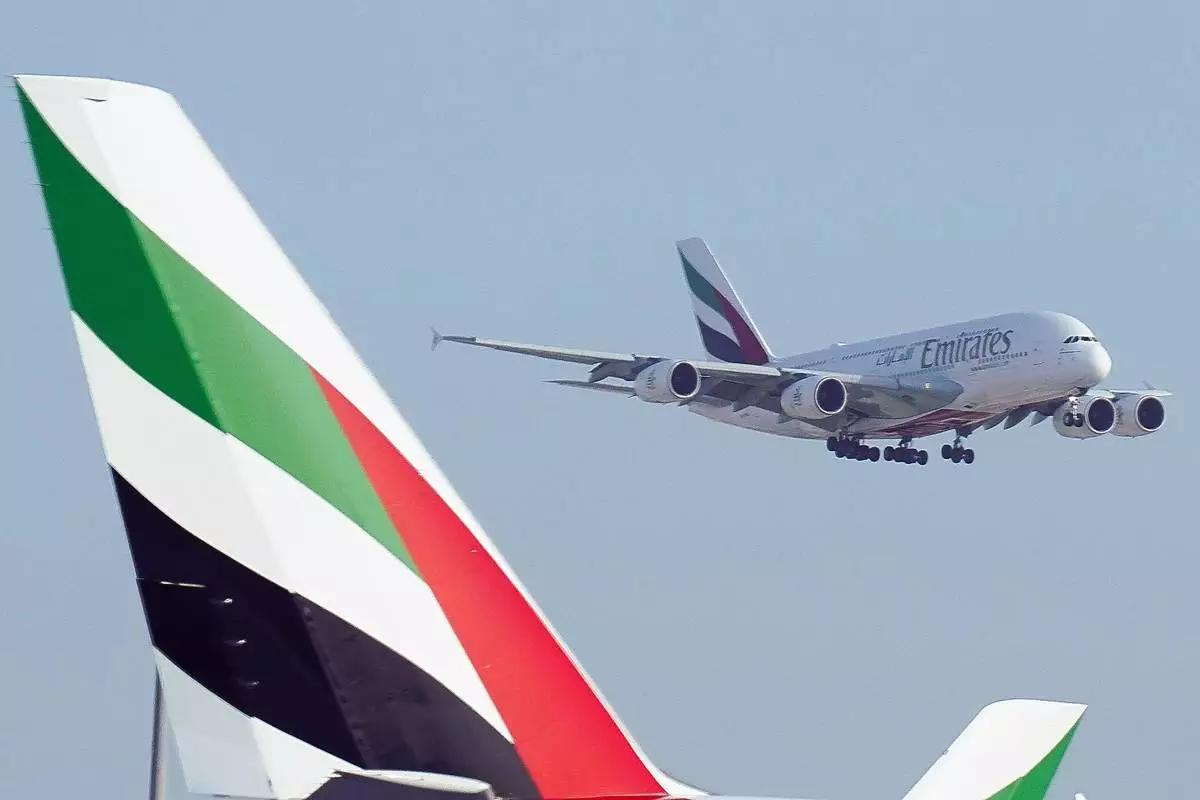The United Arab Emirates has relaxed and removed a range of limits on foreign ownership of companies, state-run media reported Monday, in the country’s latest bid to boost its global status and attract foreign investors.
The overhaul signals yet another startling change for the federation of seven desert sheikhdoms as it grapples with the economic fallout of the pandemic.
Earlier this month, the UAE announced a series of reforms to its Islamic legal code, allowing unmarried couples to cohabitate, improving protections for women and loosening restrictions on alcohol consumption. The country's Islamic “personal” laws had at times flown in the face of the freewheeling image that the UAE, with its 8 million foreigners and just 1 million Emiratis, sought to project to the world.
The dramatic changes come as the UAE has spent billions of dollars preparing to host some 25 million visitors for the World Expo, which was pushed back to 2021 because of the pandemic. The emirates also expect Israelis to join the legions of foreigners who have opened up businesses and bought apartments in the coastal cities of Dubai and Abu Dhabi following a breakthrough U.S.-brokered normalization deal between the countries. Dubai in particular, which was teetering on the brink of an economic downturn before the pandemic thanks to a weak real estate market, is eager for the influx of capital and travelers. COVID-19 has battered its economy, which draws largely from the tourism, hospitality and aviation industries.
The presidential decree that alters the corporate law helps the UAE “strengthen its leading position regionally and globally as an attractive destination for projects and companies,” state-run WAM news agency reported.
The reforms allow foreign entrepreneurs and investors to set up their own companies without involving local shareholders, the agency said. That's a welcome development for the country’s many expatriates who long had their ownership capped at 49% in firms outside free zones. Other legal amendments remove quotas requiring that Emiratis hold the majority of board positions and serve as chairs for onshore companies. Companies that want to be publicly traded will be able to sell up to 70% of their shares instead of the current 30% limit.
The amendments will certainly diminish the appeal of 45 “free” zones across the UAE, where those wanting to avoid local-hiring quotas and retain full foreign ownership would set up shop.
The move deals a major blow to longstanding rentier benefits for Emirati citizens, many of whom made their livings as figurehead company partners. Still, no one expects public resistance from locals. Some 80% of Emiratis work in the public sector and receive generous salaries and subsidies. They closely hew the government line in the hereditarily ruled sheikdom. Political parties and labor unions remain illegal.
State-linked newspaper The National reported the decree in further detail, saying the foreign ownership amendments would take effect within six months. Companies could take an entire year to start complying with the changes, it added.
DUBAI, United Arab Emirates (AP) — The long-haul carrier Emirates announced Monday it saw record profits of $4.7 billion in 2023 as the airline fully took flight after the turbulent years of the coronavirus pandemic disrupted its operations.
Emirates, owned by Dubai's government, announced revenues of $33 billion, compared to $29.3 billion the year before. Profit the year prior had been $2.9 billion.
The airline carried 51.9 million passengers in its 2023 financial year, as compared to 43.6 million the year prior.
“Throughout the year, we saw high demand for air transport and travel related services around the world, and because we were able to move quickly to deliver what customers want, we achieved tremendous results,” Sheikh Ahmed bin Saeed Al Maktoum, the chairman and CEO of Emirates, said in a statement.
“We are reaping the benefit of years of non-stop investments in our products and services, in building strong partnerships, and in the capabilities of our talented people.”
Sheikh Mohammed bin Rashid Al Maktoum, the ruler of Dubai, praised the airline, noting it “took off 39 years ago and the world of aviation is no longer what it was before.”
“What is coming will be more beautiful, greater and better, God willing,” Sheikh Mohammed wrote on the social platform X.
The Emirates' results track with those for its base, Dubai International Airport. The world's busiest airport for international travelers had 86.9 million passengers last year, surpassing numbers for 2019 just before the coronavirus pandemic grounded global aviation. The airport had 89.1 million passengers in 2018 — its busiest-ever year before the pandemic.
The airport now plans to move to the city-state’s second, sprawling airfield in its southern desert reaches in the next 10 years in a project worth nearly $35 billion.
The overall Emirates Group, which includes travel company dnata, as well as food, beverage and leisure holdings, reported profits of $5.1 billion off revenues of $37.4 billion.
The group declared a dividend to its owner, the sheikhdom's sovereign wealth fund known as the Investment Corporation of Dubai, of $1 billion. It also gave its over 112,000 employees 20-weeks bonus pay, according to an internal email sent to staff seen by The Associated Press.
The city-state, one of seven hereditarily ruled, autocratic sheikhdoms that make up the United Arab Emirates, provided Emirates some $4 billion in a bailout at the height of the pandemic. The annual report said Emirates had repaid $2.6 billion of that loan during the last financial year.
In November, Emirates announced a $52 billion deal to purchase 90 Boeing 777 aircraft, 55 of them 777-9 variants and 35 of them 777-8s. Emirates will also add an additional five 787 Dreamliners to its previous order of 30 aircraft.
For years, Emirates has relied on the Boeing 777 and the double-decker Airbus A380 to ferry passengers around the world. That will change in September, when Emirates says it will begin flying the Airbus A350 on routes.
The airline has also embarked on a $2 billion retrofit program for its aircraft.
But challenges remain for the carrier. Saudi Arabia plans to push into the market with Riyadh Air, a new carrier that made a jet deal valued around $37 billion with Boeing just last year with the flagship carrier Saudia.
Climate change may be another concern as well — the wider UAE saw its heaviest recorded rainfall ever last month, which disrupted Emirates' flights for days.

FILE - An Emirates Airbus A380 jumbo jet lands at Dubai International Airport in Dubai, United Arab Emirates, Friday, Sept. 9, 2022. The long-haul carrier Emirates announced Monday, May 13, 2024, it saw record profits of $4.7 billion in 2023 as the airline fully took flight after the turbulent years of the coronavirus pandemic disrupted its operations.(AP Photo/Jon Gambrell, File)






